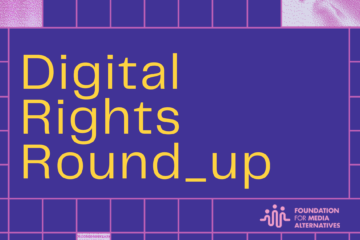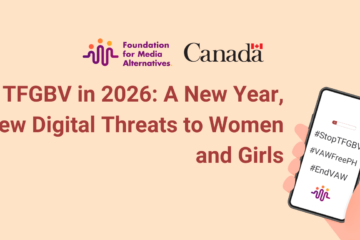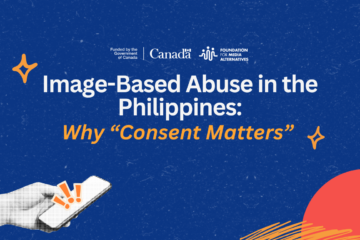Internet access, pending proposed measures, disinformation, and data breach: The FMA Digital Rights Roundup (March 1-15, 2021)
The FMA Digital Rights Roundup contains regular updates on what Filipinos need to know about their digital rights.
Gatchalian calls out telcos’ constant poor internet service
After reiterating that over three months have lapsed since President Rodrigo Duterte’s ultimatum to telcos to improve their services, Senator Win Gatchalian expressed that customers have long suffered unreliable internet connectivity in the Philippines. He mentioned how consumers continue to flood social media pages of these telcos to report poor network service, especially when workers shifted to a work-from-home setup. Read more on the report here.
House panel approves satellite liberalization bill
The House Committee on Information and Communications Technology approved the House Bill No. 7081, the proposed Satellite Liberalization Act, which focuses to make access to satellite-based technology more inclusive, according to Representative Joey Salceda. In his speech, Rep. Salceda stressed the need for this measure to be passed to help bring prosperity to the countryside, which is less likely to get connected to the internet, preventing them to access to opportunities that are technology-based. Read more on the report here.
Public now more aware of mechanisms vs. cybercrime: BSP
With the increasing complaints reported by public on unauthorized, fraudulent transactions, among others, Bangko Sentral ng Pilipinas (BSP) Governor Benjamin Diokno believes that Filipinos are more aware of the mechanisms against cybercrime. BSP’s Consumer Protection and Market Conduct Office received about 20,000 complaints from 2020 alone and 13% of these focus on issues such as fraud and unauthorized transactions. Governor Diokno mentioned that these cased continues to encourage them to push for the passage of proposed measures to protect consumers, especially now that more people use electronic banking and channels for financial transactions because of the pandemic. Read more on the report here.
Experts underscore need for getting more cybersecurity professionals in APAC
Cybersecurity experts emphasized need for education and capacity-building to make cyberspace more secure. 2nd Asia Pacific Online Policy Forum organized by Kaspersky focused on how policies and strategies are shaped in APAC. More than 1,000 participants attended the forum including executive officers from various sectors and top government officials. An expert mentioned that graduates from colleges and universities must be exposed to real-life drills, in order to improve their cybersecurity skills and awareness. Read the detailed report here.
CSC takes steps to protect data privacy after reported website breach
After a data breach due to alleged weak security measures, the Civil Service Commission (CSC) assured the public that necessary steps were taken to ensure data privacy. To further look into the incident, CSC reported it to the National Privacy Commission (NPC) and Cybercrime Investigation and Coordinating Center (CICC). Read more here.
Philippine user data from lending app Cashalo listed for sale on dark web
Personal data of 3.3 million users of buy now, pay later lending (BNPL) app Cashalo has been found for sale on dark web. The names, passwords, e-mails, phone numbers, and device identifications have been posted by a user called “creepxploit”. Foundation for Media Alternatives, an NGO advocating for ICTs for democracy and sustainable development released a report on transparency and mobile lending controversy. Read the full report here.
Foundation for Media Alternatives Legal and Policy Advisor Atty. Jamael Jacob said in an interview on immunity passports, which is a government-issued document stating that a person is already vaccinated or recovered from COVID-19, that there are risks in presenting health data or information if the security features of these vaccine passports are not put in proper place. Watch the interview here.
Stars, influencers get paid to boost Duterte propaganda, fake news
A Rappler investigation unfolded that Filipino celebs and influencers earn hundreds of thousands to millions of pesos by unknowingly or indirectly amplifying false information and government propaganda. Read the detailed report by Rappler here.
Badoy red-tags Rappler over fact check articles
Rappler released a statement condemning Presidential Communications Undersecretary and National Task Force to End Local Communist Armed Conflict (NTF-ELCAC) Spokesperson Lorraine Badoy baseless and irresponsible red-tagging because of fact-checking her misleading facebook posts. Read the details and Rappler’s statement here.
Weak Internet Faced by 31% of Philippine Home Schoolers: Poll
Social Weather Stations (SWS) poll said that 31% of families with online distance learners have weak internet connections. The poll revealed that a combined 68% said they have either strong or fair connections. With the Philippines having one of the highest numbers of COVID-19 infections in Southeast Asia, students continue to study at home, unfolding the existing issues on access and internet connectivity. Read the full report here.
Facebook, Twitter urged to crack down on sexual abuse
Senator Risa Hontiveros, chairperson of the Senate Committee on Women and Children called on social media giants like Facebook and Twitter to immediately crack down on the rising number of incidents of online abuse and sexual exploitation of women and children. Read the report here.
4 convicted for online sexual exploitation of 11 kids in Cebu
After pleading “guilty” to two cases of online sexual exploitation of children, four women were convicted in Lapu-Lapu City, Cebu. In a rescue operation conducted by the Women and Children Protection Center Visayas Field Unit (WCPC-VFU), the first case involved nine minors, with two boys and seven girls and the second case involved a parent offering her three-year-old son and a five-year-old girl for online sex. Read the details of the report here.
Kiko: Social media sites should takedown abusive behavior online
The Senate Committee on Women, Children, Family Relations and Gender Equality held a meeting to discuss online sexual abuse and exploitation of children. Senator Kiko Pangilinan highlighted that part of the prevention id the immediate takedown of posts to prevent spread of private materials. In relation, Unicef mentioned that the Philippines is the global epicenter of live-stream sexual abuse trade and number one global source of child pornography. Read the details of the report here.
If you want to subscribe to our newsletter, email us: digitalrightsph@protonmail.ch
For more content on Digital Rights, visit our website and follow us on Facebook, Twitter, Instagram, and Youtube.



0 Comments